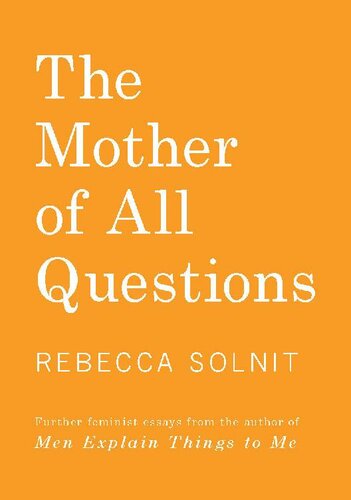
The Mother of All Questions
- اطلاعات
- نقد و بررسی
- دیدگاه کاربران
نقد و بررسی

January 2, 2017
The latest collection of essays from author and activist Solnit continues in the same vein as 2014âs popular Men Explain Things to Me with short, incisive essays that pack a powerful punch. This collection examines age-old philosophical questions: What does it mean to live a happy life? What is the role of art and entertainment in our day-to-day lives? How does language create myths about happiness and art?âfrom a contemporary, feminist perspective. As Solnit chronicles recent events, including comedian Amy Schumerâs parodies of rape culture, Esquire magazineâs list of 80 books every man should read, Gamergate, and the Isla Vista massacre, the bookâs themes gain greater significance. Solnit argues that books, movies, and other forms of entertainment reinforce self-centered concepts of heroism and happiness that promote entitlement and decrease empathy. Solnit points out that women are frequent targets of this entitlement and decreased empathy, but she also credits men such as government whistle-blower Edward Snowden, stand-up comedian Hannibal Buress, and activist Richard Martinez, whose son was killed in a mass shooting, for standing up for their principles and carving out a less violent or self-centered definition of manhood. Chock-full of references to the work of women at the forefront of contemporary feminist thought, Solnitâs essays will stir minds and spark further investigation.

February 1, 2017
A distinguished cultural critic tackles "the binaries and boundaries of gender" while examining the continuing evolution of feminism.In her latest collection, Harper's contributing editor Solnit (Men Explain Things to Me, 2014, etc.) examines how women continue to struggle to make their voices heard in a violent, misogynist world. In the first section, the author deals with the act of silencing. Whether in professional situations involving unfair treatment or personal ones involving abuse or rape, patriarchal culture has discouraged women from speaking out against gender injustice. At the same time, men have also been forced into silence about their interior lives in exchange for "power and membership" in patriarchy. Yet women--and men--continue to make progress. Solnit points to the changes in attitude toward rape and how comedians like Tina Fey and Amy Schumer have openly challenged perpetrators. They have not succeeded in winning the war "for everyone to have their basic human rights respected," but they have helped turn the tide against acceptance of rape culture. Moreover, social initiatives like the Obama administration's 2014 "It's On Us" project to "get bystanders, particularly men," to protect potential victims of assault are positive signs of further change. In the second section of the book, the author focuses more on language used in discourse about women, which not only emphasizes dependency, but also overlooks how the concept of gender is built upon categories that exclude differences that transcend the male/female binary. She also offers commentary on how culturally iconic works--e.g., Lolita--continue to feed into ideas of women as "disposable...absent, or worthless." Others, like the 1956 film Giant, can be read to suggest that patriarchy can successfully be replaced by "some kind of open, negotiated reshuffling of everything." Trenchant and hopeful, the book reveals that the ongoing work of righting the wrongs of patriarchy is only part of a much larger project of social justice for all people. As always, Solnit is eloquent and sharply insightful.
COPYRIGHT(2017) Kirkus Reviews, ALL RIGHTS RESERVED.

February 1, 2017
Solnit (Men Explain Things to Me) has compiled a new collection of essays exploring the current U.S. feminist movement. An overarching theme of this intersectional essay collection is silence, specifically its role in suppressing women's stories and experiences. Solnit argues that silence has taken opportunities away from women and has enabled rape and domestic violence. She discusses prominent legal cases, such as those relating to Jian Ghomeshi, Bill Cosby, and the Isla Vista shootings. Additionally, silence (and its counterpart shame) lessens women's freedom and value by taking away their ability to tell their stories. A large portion of this book is devoted to men, specifically how their experiences inform and hinder feminism. The author demonstrates how repression of one's emotions in exchange for power have crippled men. Additional essays address misogyny and rape jokes in comedy as well as varied gender roles in literature, and the role of language in discussions of sexual assault and domestic violence. VERDICT This thought-provoking and important anthology will be of interest to anyone interested in gender and feminism.--Rebekah Kati, Durham, NC
Copyright 2017 Library Journal, LLC Used with permission.

February 1, 2017
In 2010, the term mansplaining was one of the New York Times' words of the year; it was coined during the conversation surrounding an essay Solnit wrote in 2008 about gendered communication styles, which eventually became the title essay in Men Explain Things to Me (2014). Solnit's newest book of essays serves as a companion and follow-up to that collection, moving beyond the mansplain into a keen and timely commentary on gender and feminism. Though the topics vary wildlySolnit touches on everything from the language of public-health guidelines to the unexpected feminism of an early Elizabeth Taylor filmeach essay echoes the ways it can feel impossible simply to be a woman or, indeed, the ways traditional views of gender fail us all. Solnit writes, There is no good answer to how to be a woman; the art may instead lie in how we refuse the question. Solnit's voice is calm, clear, and unapologetic; each essay balances a warm wit with confident, thoughtful analysis, resulting in a collection that is as enjoyable and accessible as it is incisive.(Reprinted with permission of Booklist, copyright 2017, American Library Association.)




دیدگاه کاربران